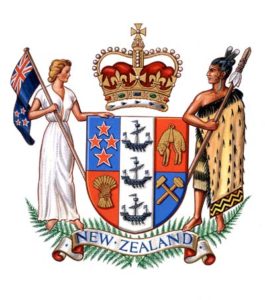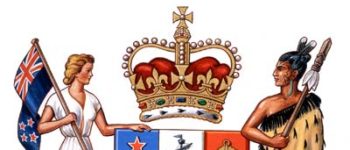1835: The Pakeha Slur
May 7, 2019
By AHNZ
“Pakeha means stranger, alien, or foreigner.”- Remarks on New Zealand; Governor Robert FitzRoy (1846)
“Pakeha means stranger, and is applied to any white man”- The boy travellers in Australasia (1888)
Pakeha– “English, foreign, European, exotic – introduced from or originating in a foreign country….foreigner, alien” – maoridictionary.co.nz
“..alike to the native population and to Her subjects…”/”..te tangata Maori ki te Pakeha a noho ture kore ana.” – Treaty of Waitangi (1940)
“Ka pai te ánga o te pákeha“/”the performance of the white man is good.”- A Grammar and Vocabulary of the Language of New Zealand, Kendall (1820)
“Pākehā is just a noun.”- Glenn Mcconnell, Stuff
Anarchist History of New Zealand Opinion
 New Zealand must be the only settler society where Europeans call themselves by a name the natives gave them. These are the remarks of David Fischer¹ who also rightly notes that pakeha is an “old Maori word for weird spirits in strange white skins.” That old word was adapted to serve as a translation when Kendal needed a word for ‘white man’ in his 1815 dictionary. According to King² the word had become widespread among Maoris by the 1830s. This noun from the north beat out competing³ Maori language words (as usual) because it was in the north that the dictionaries were written! Likewise, The Treaty of Waitangi which also employed the word pakeha.
New Zealand must be the only settler society where Europeans call themselves by a name the natives gave them. These are the remarks of David Fischer¹ who also rightly notes that pakeha is an “old Maori word for weird spirits in strange white skins.” That old word was adapted to serve as a translation when Kendal needed a word for ‘white man’ in his 1815 dictionary. According to King² the word had become widespread among Maoris by the 1830s. This noun from the north beat out competing³ Maori language words (as usual) because it was in the north that the dictionaries were written! Likewise, The Treaty of Waitangi which also employed the word pakeha.
The Maori world apparently needed a sweeping generalised term for ‘the white man’ as a collection. Likewise, the Romans refereed to barbarians, the Celts to sasanachs, the Allies to Huns, rather than trouble about the specifics of what particular nation or ethnicity a person was affiliated with.
Busby and Hobson both codified that word, pakeha, into official documents (Declaration of Independence (1835,) and Treaty of Wantangi (1840)) and after that the precedent was set. Rather than seek explicit terms like ‘settlers’ or ‘whalers’ or ‘US citizens’ or ‘French citizens’ or ‘British’ they lazily slung this catch-all word, pakeha, outlander, over everything.
No problem though, right? Let the State have its messy language and scams, let the early Maori use pakeha for as much time as they need to figure out the nations of the world and their names. Yes, it is a shame the word servicing the job also means strange alien foreigner but that’s the savage point of view from the early 1800s and not our problem. Right?
Let’s fast-forward from the C19th to check that the word became obsolete..
“Pakeha…denotes people and influences from Europe..in preference to ‘European’ to distinguish between those things that are..European..and those that..have undergone change as a result of history, geography and culture in New Zealand. In other words..an indigenous expression to describe New Zealand people and things that are not Maori.”- Pakeha- The Quest for Identity in New Zealand, King (1991)
Wait…what? Not only is this primitive’s word still with us but the settler civilisation has also picked it up to refer to itself!? What the hell happened?
The State’s word, pakeha, did not remain a benign tumour within government but jumped lattices into civilised society as well; It has infested our culture. The thesis of pakeha generates a conflicting anti-thesis, Māori. It keeps New Zealanders divided, unequal, oppositional between two artificially concocted stereotypical identities.
One group is belonging, original, defining, normal; The other is alien, foreigner, defined, strange. Pakeha is a hegemonic term.
If one group is perceived as healthy and strong it incites challenge from the other. Challenge incites conflict, and conflict is managed by our true enemy The State while we’re distracted by our contrived enmity toward our brothers…
Every few years, someone asks a rhetorical question about the meaning or use of the word Pākehā to describe non-Polynesian New Zealanders.- Opinion: Pākehā is not an insult, Tom O’Connor; Stuff
I don’t know how many times people need to keep saying this, but I hope this is the last.- How many times does this need to be said? Pākehā is not a slur, Glenn McConnell; Stuff
“Some absurd statements concerning the origin and meaning of Maori words and place-names often find their way into the newspapers,” they said. The writer addressed a claim made in the press that Māori developed the word as a swear to laugh at whalers.- New Zealand Railways Magazine, 1933; ibid
Of course it will erupt again, and again! To think otherwise is to not understand what pakeha is. An open wound. The White Man’s guilt. If you call yourself pakeha you surrender to another culture the right of defining your identity by their own divisive terms. Hun, barbarian, sasanach, pakeha. None of these terms are linguistic slurs per se but go much deeper. They are an epistemological slur against all New Zealanders rather than any particular group or person. That’s a bit deep for most to fathom intellectually though but we all sense it and the eruptions are periodical…
Prominent Christchurch academic accused of racism for using the word ‘pākeha’; Newshub
To be pakeha, as King says above, is to be defined as “not Maori” and “not European.” It’s not about being but lack of being. To call yourself pakeha is not only to self-attack but to do so in a foreign language as evidenced by the form you’ll most often see used by the media: Pākehā. Those who encourage its use are always Victimhood Culture like King himself with the objective of colonising the minds of others; Because VCs always project they’re frequently found lecturing others about the evils of Colonialism!
“He iwi tahi tatou” (“We are now one people”)- Hobson,1840
The State asks us all the time to identify ourselves as Maori or Pakeha; I consistently refuse. I’m reaching for the synthesis: New Zealander. The terms Maori and pakeha are valuable terms in language, there’s no need to stop employing them. I wont be. The point is not to fall into the trap of defining yourself according to them. That’s pretty hard to do when the media and State and public schools have been propagandising us to do so since 1835. No tribe!
Shun negative terms; do not let them become the focus of your thought.
—
1 Fairness and Freedom; Fischer (2012)
2 The Penguin History of New Zealand; King (2003)
3 Rather than pakeha we may have ended up with tangata pora (cunning man) or tangata tipua (tax collector); ibid
image ref. NZ Coat of Arms; Illustrates the essential dichotomy of how Kiwis have been divided to be conquered
Ref. also Double Consciousness, Du Bois
3 thoughts on "1835: The Pakeha Slur"
Leave a Reply
 Like Comment Share
Like Comment Share






Love it! great summary thnaks
I never tick the pakeha box.When a Maori calls out “Hey Pakeha” he does not mean “Hey friend”. My first male best mate at age about 11 was a Maori, his family gave him ethics, he stuck up for me in times of trouble,he was born at home as were all the family. We started Wesley Intermediate together from Green Bay. Never felt any racism from Maori as I grew up.
I’d suggest you grew up before the likes of The Otara Project bore fruit such as Nga Tamatoa. The Boomer Maoris turned race relations on its head and they can’t even speak Maori- the King himself included.
Ref. https://ahnz.anarkiwi.co.nz/1952-the-otara-project/